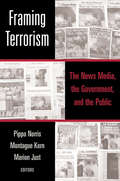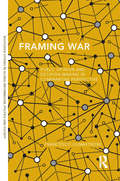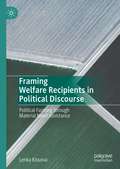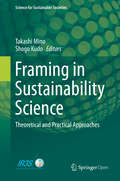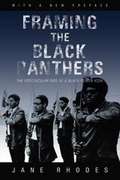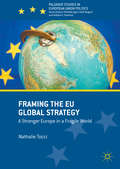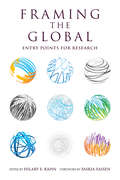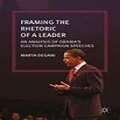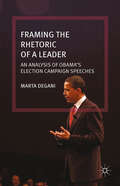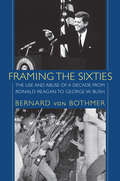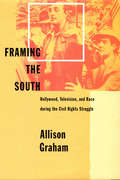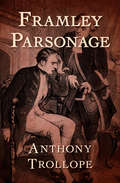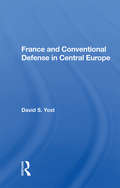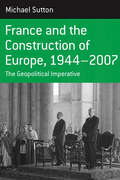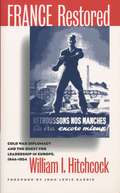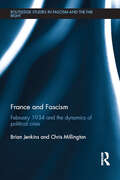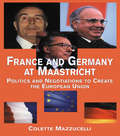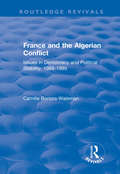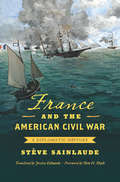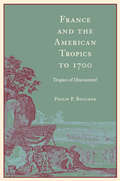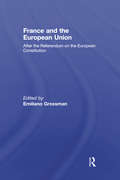- Table View
- List View
Framing Terrorism: The News Media, the Government and the Public
by Pippa Norris Montague Kern Marion JustTerrorism now dominates the headlines across the world-from New York to Kabul. Framing Terrorism argues that the headlines matter as much as the act, in political terms. Widely publicized terrorist incidents leave an imprint upon public opinion, muzzle the "watchdog" role of journalists and promote a general one-of-us consensus supporting security forces.
Framing War: Public Opinion and Decision-Making in Comparative Perspective (Routledge Studies in Global Information, Politics and Society)
by Francesco OlmastroniMost research on framing has focused on media and elite frames: the ways that the mass media and politicians present information about issues and events to the public. Until now, the process by which citizens’ opinions may affect the initial frame-building process has been largely ignored. The two-way flow of influence between public opinion and decision-makers has been analyzed more from a top-down than a bottom-up perspective. Olmastroni addresses this issue by introducing a cyclical model of framing. Additionally, most empirical studies on media framing have centered on the United States. Olmastroni’s text seeks to overcome this limitation of prior research by examining different types of framing in three different countries. Framing War uses the recent war on Iraq as a case study, focusing on the elite and media framing of this event in order to examine the interaction between the political elite and the mass public in three Western democracies—France, Italy, and the US—during the early and on-going stages of the military crisis. The book analyzes whether and, potentially, the extent to which decision-makers tracked and responded to public opinion in presenting their foreign policy choices. It examines the strategies and approaches that governments potentially adopted to influence public opinion towards either the need for or the lack of need for a military intervention. By representing the framing paradigm as a cycle, Olmastroni shows how each actor within the system (i.e., government and other elites, news media, and public opinion) is linked to the others and contributes to the final representation of an issue. In contrast with other theoretical perspectives of framing, this book states that the framing influence does not only proceed from the government to the public, but it often moves at the same level of the system, with each actor playing different roles. Olmastroni’s insights on framing are significant for researchers in international relations, political communication, public opinion, comparative politics, and political psychology, as well as policy analysts, journalists, and commentators.
Framing Welfare Recipients in Political Discourse: Political Farming through Material Need Assistance
by Lenka KissováThis book explores the shift towards individual responsibility that is increasingly evident in welfare systems across the world. The book will be of interest to students and scholars across sociology, social policy, and political science, with a particular focus on migration, minorities, political discourse, securitisation, social justice and human rights."This book offers a compelling read, analysing how workfare is legitimated in the Central European context, through the innovative metaphor of “political farming.” The analytical framework brings together several distinct streams of theorizing (critical discourse studies, critical security studies, governmentality, boundary-making, and the dynamics of ethnic relations) seamlessly and effectively. Through a very nuanced discursive analysis, Kissová shows how the poor, the offenders, and the “unadaptable” – categories policymakers use to talk about material need recipients – are linked pathologically with criminality, abuse of the system and other negative perceptions. This is a must-read text for anyone interested in how political actors justify questionable legislation that cements inequality in today’s neoliberal milieu.”— B. Nadya Jaworsky, Associate Professor, Sociology, Masaryk University, Czech Republic "Lenka Kissová’s book is clearly written and carefully researched. Her interdisciplinary insight and discursive analysis of parliamentary debates on Slovak “workfare” policies illustrates the deliberate, precise and politicized colocation of Roma marginalization and economic disadvantage, in a manner that starkly illustrates systemic racism dressed up as morally necessary regulatory reform. Moreover, her research has broader comparative and methodological relevance given how she layers in and utilizes governmentality, securitization and legitimation theory, unmasking how neoliberal economic assumptions and dog whistle politics, woven into the speech of politicians, works to demonize recipients as real or potential cheats and criminals, enact further social exclusion and heighten inequality and fear while not-so-subtly promoting existing prejudices. Her overarching metaphor—that of parliamentarians engaging in “political farming” where their ideas seed and take root in fertile soil of the national landscape resulting in regulatory “products”—effectively demonstrates how social reality generally and state regulation specifically can be constructed divorced from actual evidence, a process beyond her specific case and critically relevant to our times."— Barbara J. Falk, Professor, Department of Defence Studies, Canadian Forces College/Royal Military College of Canada, Fellow, Centre for European, Russian and Eurasian Studies, University of Toronto, Canada
Framing in Sustainability Science: Theoretical and Practical Approaches (Science for Sustainable Societies)
by Takashi Mino Shogo KudoThis open access book offers both conceptual and empirical descriptions of how to “frame” sustainability challenges. It defines “framing” in the context of sustainability science as the process of identifying subjects, setting boundaries, and defining problems. The chapters are grouped into two sections: a conceptual section and a case section. The conceptual section introduces readers to theories and concepts that can be used to achieve multiple understandings of sustainability; in turn, the case section highlights different ways of comprehending sustainability for researchers, practitioners, and other stakeholders. The book offers diverse illustrations of what sustainability concepts entail, both conceptually and empirically, and will help readers become aware of the implicit framings in sustainability-related discourses. In the extant literature, sustainability challenges such as climate change, sustainable development, and rapid urbanization have largely been treated as “pre-set,” fixed topics, while possible solutions have been discussed intensively. In contrast, this book examines the framings applied to the sustainability challenges themselves, and illustrates the road that led us to the current sustainability discourse.
Framing the Black Panthers: The Spectacular Rise of a Black Power Icon
by Jane RhodesA potent symbol of black power and radical inspiration, the Black Panthers still evoke strong emotions. This edition of Jane Rhodes's acclaimed study examines the extraordinary staying power of the Black Panthers in the American imagination. Probing the group's longtime relationship to the media, Rhodes traces how the Panthers articulated their message through symbols and tactics the mass media could not resist. By exploiting press coverage through everything from posters to public appearances to photo ops, the Panthers created a linguistic and symbolic universe as salient today as during the group's heyday. They also pioneered a sophisticated version of mass media activism that powers contemporary African American protest. Featuring a timely new preface by the author, Framing the Black Panthers is a breakthrough reconsideration of a fascinating phenomenon.
Framing the EU Global Strategy
by Nathalie TocciThis book tells the story of the EU Global Strategy (EUGS). By reflecting back on the 2003 European Security Strategy, this book uncovers the background, the process, the content and the follow-up of the EUGS thirteen years later. By framing the EUGS in this broader context, this book is essential for anyone wishing to understand European foreign policy. The author, who drafted the EUGS on behalf of High Representative and Vice President of the Commission (HRVP) Federica Mogherini, uses the lens of the EUGS to provide a broader narrative of the EU and its functioning. Tocci's hybrid role as a scholar and adviser has given her unique access to and knowledge of a wide range of complex structures and actors, all the while remaining sufficiently detached from official processes to retain an observer's eye. This book reflects this hybrid nature: while written by and for scholars, it is not a classic scholarly work, but will appeal to anyone wishing to learn more about the EUGS and European foreign policy more broadly.
Framing the European Union
by Ece Özlem AtikcanWhat is the impact of political language upon public opinion towards European integration? Based upon media analysis, public opinion data and over 140 in-depth interviews with senior officials and campaigners, Ece Özlem Atikcan examines six EU referendum votes: in Spain, France, the Netherlands and Luxembourg on the European Constitution in 2005; and in Ireland on the Lisbon Treaty in 2008 and 2009. In all instances, polls show that the voting public favored the referendum proposals before the campaigns began, yet this initially positive public opinion melted away in three of these six cases. Why did this occur? Atikcan demonstrates that the key to the puzzle lies in political campaigns, where argument strategies can, at least temporarily, reverse public opinion enough to affect referendum outcomes. Providing a critical analysis of campaign strategy and EU communication policy, this book will be essential reading for academics, policymakers, politicians and future campaigners.
Framing the Future: How Progressive Values Can Win Elections and Influence People
by Bernie HornPolls consistently show that most Americans are progressives at heart. By margins of at least two to one, we favor affordable healthcare for all, even if it means raising taxes; want federal action to combat global warming; support stricter gun control; don’t want Roe vs. Wade overturned; and the list goes on. So why is it so hard for progressive candidates to win elections? Because, says Bernie Horn, most progressives don’t know how to explain their ideas in ways that resonate with “persuadables”—the significant slice of the electorate who don’t instantly identify as Democrats or Republicans. These are the voters who swing elections. There’s been a lot of theoretical discussion about framing lately, but Framing the Future isn’t theory—the concepts outlined have been used successfully by progressive candidates across the nation, even in such conservative bastions as Montana, Arizona, and Florida. Drawing on rigorous polling data and his own experience as a veteran political consultant, Horn explains how persuadable voters think about issues and make political decisions and why, as a result, the usual progressive approaches are practically designed to fail with them. He offers a crash course in the nuts and bolts of framing and shows how to use three bedrock American values—freedom, opportunity, and security—to frame progressive positions in a way that creates a consistent, unified political vision that will appeal to persuadable voters. He even offers advice on specific words and phrases to use when talking about a variety of issues and ideas.
Framing the Global: Entry Points for Research (Framing the Global)
by Saskia Sassen Hilary E. KahnFraming the Global explores new and interdisciplinary approaches to the study of global issues. Essays are framed around the entry points or key concepts that have emerged in each contributor's engagement with global studies in the course of empirical research, offering a conceptual toolkit for global research in the 21st century.
Framing the Race in South Africa
by Karen E. FerreePost-apartheid South African elections have borne an unmistakable racial imprint: Africans vote for one set of parties, whites support a different set of parties, and with few exceptions, there is no crossover voting between groups. These voting tendencies have solidified the dominance of the ruling African National Congress (ANC) over South African politics and turned South African elections into "racial censuses. " This book explores the political sources of these outcomes. It argues that although the beginnings of these patterns lie in South Africa's past, in the effects apartheid had on voters' beliefs about race and destiny and the reputations parties forged during this period, the endurance of the census reflects the ruling party's ability to use the powers of office to prevent the opposition from evolving away from its apartheid-era party label. By keeping key opposition parties "white," the ANC has rendered them powerless, solidifying its hold on power in spite of an increasingly restive and dissatisfied electorate.
Framing the Rhetoric of a Leader
by Marta DeganiBased on a selection of 30 election campaign speeches during Obama's first run for the American presidency in 2008, this book investigates the Democratic presidential candidate's much celebrated rhetoric from a cognitive semantics point of view.
Framing the Rhetoric of a Leader: An Analysis of Obama’s Election Campaign Speeches
by M. DeganiBased on a selection of 30 election campaign speeches during Obama's first run for the American presidency in 2008, this book investigates the Democratic presidential candidate's much celebrated rhetoric from a cognitive semantics point of view.
Framing the Sixties: The Use and Abuse of a Decade from Ronald Reagan to George W. Bush
by Bernard Von BothmerOver the past quarter century, American liberals and conservatives alike have invoked memories of the 1960s to define their respective ideological positions and to influence voters. Liberals recall the positive associations of what might be called the "good Sixties"--the "Camelot" years of JFK, the early civil rights movement, and the dreams of the Great Society--while conservatives conjure images of the "bad Sixties"--a time of urban riots, antiwar protests, and countercultural revolt. In Framing the Sixties, Bernard von Bothmer examines this battle over the collective memory of the decade primarily through the lens of presidential politics. He shows how four presidents--Ronald Reagan, George H. W. Bush, Bill Clinton, and George W. Bush--each sought to advance his political agenda by consciously shaping public understanding of the meaning of "the Sixties." He compares not only the way that each depicted the decade as a whole, but also their commentary on a set of specific topics: the presidency of John F. Kennedy, Lyndon Johnson's "Great Society" initiatives, the civil rights movement, and the Vietnam War. In addition to analyzing the pronouncements of the presidents themselves, von Bothmer draws on interviews he conducted with more than one hundred and twenty cabinet members, speechwriters, advisers, strategists, historians, journalists, and activists from across the political spectrum--from Julian Bond, Daniel Ellsberg, Todd Gitlin, and Arthur Schlesinger to James Baker, Robert Bork, Phyllis Schlafly, and Paul Weyrich. It is no secret that the upheavals of the 1960s opened fissures within American society that have continued to affect the nation's politics and to intensify its so-called culture wars. What this book documents is the extent to which political leaders, left and right, consciously exploited those divisions by "framing" the memory of that turbulent decade to serve their own partisan interests.
Framing the South: Hollywood, Television, and Race during the Civil Rights Struggle
by Allison GrahamWhat patterns emerge in media coverage and character depiction of Southern men and women, blacks and whites, in the years between 1954 and 1976? How do portrayals of the region and the equal rights movement illuminate the spirit and experience of the South—and of the nation as a whole? In Framing the South, Allison Graham examines the ways in which the media, particularly television and film, presented Southerners during the period of the civil rights revolution.Graham analyzes depictions of southern race and social class in a wide range of Hollywood films—including A Streetcar Named Desire, The Three Faces of Eve, and A Face in the Crowd from the 1950s; later films like Cool Hand Luke, In the Heat of the Night, and Mississippi Burning; and MGM's Elvis Presley vehicles. She traces how films have confronted—or avoided—issues of racism over the years, paralleling Hollywood depictions with the tamer characterization of the likeable "hillbilly" popularized in television's The Real McCoys and The Andy Griffith Show. Graham reinforces the political impact of these fictional representations by examining media coverage of civil rights demonstrations, including the documentary Crisis: Behind the Presidential Commitment, which reported the clash between Robert Kennedy and Governor George Wallace over the integration of the University of Alabama. She concludes with a provocative analysis of Forrest Gump, identifying the popular film as a retelling of post-World War II Southern history.
Framley Parsonage: Large Print (The Chronicles of Barsetshire #4)
by Anthony TrollopeThe enduring love story and satirical comedy by a master of the English novel. A young vicar&’s ambition drives him into a costly bargain in this classic tale from one of the Victorian era&’s finest novelists. Set in rural England in the fictitious county of Barsetshire, the fourth novel in the Chronicles of Barsetshire brilliantly examines the intersection of romance and social class. Mark Robarts is a young, ambitious vicar from the village of Framley, who is living off a benefice provided by Lady Lufton, the mother of his childhood friend, Ludovic. When Robarts decides to try his hand at advancing his wealth and social standing by seeking connections and business opportunities among the county&’s upper crust, he is pressured into providing a loan to Mr. Sowerby, a member of Parliament and notorious debtor. All the while, Ludovic, Lord Lufton, pursues Robarts&’s sister Lucy, despite objections from Lady Lufton, who urges her son to enter into courtship with a girl better suited to his title and social class. As debt collectors look to inventory Robarts&’s possessions—and as Lucy vows to avoid Lord Lufton if she cannot receive his mother&’s blessing—the stage is set for a hilarious and unforgettable climax. Comparing, Framley Parsonage to the other novels in the Chronicles of Barsetshire, its author noted, &“There was much Church, but more love-making.&” Filled with realistic detail and delightful turns of phrase, Framley Parsonage is a testament to Anthony Trollope&’s unique ability to combine high-minded insight with popular appeal. This ebook has been professionally proofread to ensure accuracy and readability on all devices.
France And Conventional Defense In Central Europe
by David S. YostA widespread policy prescription among defense experts of the Atlantic Alliance is the strengthening of conventional forces to reduce dependence on the early use of nuclear weapons in the event of Soviet aggression. Dr. Yost examines the critical role France could play in establishing a more powerful conventional deterrent for the West and discusse
France And The Construction Of Europe, 1944-2007
by Michael SuttonIn the second half of the twentieth century France played the greatest role - even greater than Germany's - in shaping what eventually became the European Union. By the early twenty-first century, however, in a hugely transformed Europe, this era had patently come to an end. This comprehensive history shows how France coupled the pursuit of power and the furtherance of European integration over a sixty-year period, from the close of the Second World War to the hesitation caused by the French electorate's referendum rejection of the European Union's constitutional treaty in 2005.
France Restored: Cold War Diplomacy and the Quest for Leadership in Europe, 1944-1954
by William I. HitchcockHistorians of the Cold War, argues William Hitchcock, have toooften overlooked the part that European nations played in shapingthe post-World War II international system. In particular,France, a country beset by economic difficulties and politicalinstability in the aftermath of the war, has been given shortshrift. With this book, Hitchcock restores France to the narrativeof Cold War history and illuminates its central role in thereconstruction of Europe. Drawing on a wide array of evidencefrom French, American, and British archives, he shows that Franceconstructed a coherent national strategy for domestic andinternational recovery and pursued that strategy with tenacityand effectiveness in the first postwar decade. This once-occupiednation played a vital part in the occupation and administrationof Germany, framed the key institutions of the "new" Europe,helped forge the NATO alliance, and engineered an astonishingeconomic recovery. In the process, France successfully contestedAmerican leadership in Europe and used its position as a key ColdWar ally to extract concessions from Washington on a wide rangeof economic and security issues.
France and Fascism: February 1934 and the Dynamics of Political Crisis (Routledge Studies in Fascism and the Far Right)
by Brian Jenkins Chris MillingtonFrance and Fascism: February 1934 and the Dynamics of Political Crisis is the first English-language book to examine the most significant political event in interwar France: the Paris riots of February 1934. On 6 February 1934, thousands of fascist rioters almost succeeded in bringing down the French democratic regime. The violence prompted the polarisation of French politics as hundreds of thousands of French citizens joined extreme right-wing paramilitary leagues or the left-wing Popular Front coalition. This ‘French civil war’, the first shots of which were fired in February 1934, would come to an end only at the Liberation of France ten years later. The book challenges the assumption that the riots did not pose a serious threat to French democracy by providing a more balanced historical contextualisation of the events. Each chapter follows a distinctive analytical framework, incorporating the latest research in the field on French interwar politics as well as important new investigations into political violence and the dynamics of political crisis. With a direct focus on the actual processes of the unfolding political crisis and the dynamics of the riots themselves, France and Fascism offers a comprehensive analysis which will be of interest to undergraduate and postgraduate students, as well as scholars, in the areas of French history and politics, and fascism and the far right.
France and Germany at Maastricht: Politics and Negotiations to Create the European Union (Contemporary Issues in European Politics #Vol. 3)
by Colette MazzucelliFirst published in 1997. Routledge is an imprint of Taylor & Francis, an informa company.
France and the Algerian Conflict: Issues in Democracy and Political Stability, 1988-1995 (Leeds Studies In Democratization #Vol. 5)
by Camille Bonora-WaismanThis title was first published in 2003.France and the Algerian Conflict is a study of the French response to political upheavals in Algeria since 1988. In a very short period of time, Algeria has lived through a fast track democratization process, a coup d’état and an upsurge of violence bringing the country to the brink of civil war. France’s policy towards its ex-colony during this period of political and social hardship has been very tortuous. French leaders, from the Left or the Right, have shifted back and forth from supporting 'conciliation' in Algeria to backing 'eradication'. This book retraces the main events that occurred in Algeria from 1988 to 1995 and analyses the successive policy shifts of the French government both in terms of political discourse and policy means. In particular, it seeks answers to the issue of the French opposition to the Algerian militant Islamic Salvation Front (FIS).
France and the American Civil War: A Diplomatic History (Civil War America)
by Stève SainlaudeFrance's involvement in the American Civil War was critical to its unfolding, but the details of the European power's role remain little understood. Here, Steve Sainlaude offers the first comprehensive history of French diplomatic engagement with the Union and the Confederate States of America during the conflict. Drawing on archival sources that have been neglected by scholars up to this point, Sainlaude overturns many commonly held assumptions about French relations with the Union and the Confederacy. As Sainlaude demonstrates, no major European power had a deeper stake in the outcome of the conflict than France.Reaching beyond the standard narratives of this history, Sainlaude delves deeply into questions of geopolitical strategy and diplomacy during this critical period in world affairs. The resulting study will help shift the way Americans look at the Civil War and extend their understanding of the conflict in global context.
France and the American Tropics to 1700: Tropics of Discontent?
by Philip P. Boucher“An important addition to the literature on Caribbean history and colonial societies in the 17th century.” —ChoiceTraditionally, the story of the Greater Caribbean has been dominated by the narrative of Iberian hegemony, British colonization, the plantation regime, and the Haitian Revolution of the eighteenth century. Relatively little is known about the society and culture of this region—and particularly France’s role in them—in the two centuries prior to the rise of the plantation complex of the eighteenth century. Here, historian Philip P. Boucher offers the first comprehensive account of colonization and French society in the Caribbean.Boucher’s analysis contrasts the structure and character of the French colonies with that of other colonial empires. Describing the geography, topography, climate, and flora and fauna of the region, Boucher recreates the tropical environment in which colonists and indigenous peoples interacted. He then examines the lives and activities of the region’s inhabitants—the indigenous Island Caribs, landowning settlers, indentured servants, African slaves, and people of mixed blood, the gens de couleur. He argues that the sixteenth and seventeenth centuries were not merely a prelude to the classic plantation regime model. Rather, they were an era presenting a variety of possible outcomes. This original narrative demonstrates that the transition to sugar and the plantation complex was more gradual in the French properties than generally depicted—and that it was not inevitable.
France and the European Union: After the Referendum on the European Constitution (Journal of European Public Policy Series)
by Emiliano GrossmanThe character of international trade has changed dramatically over the past twenty years. Previously published as a special issue of The Journal of European Public Policy, this volume provides a ‘state of the art’ study of the new trade politics.
